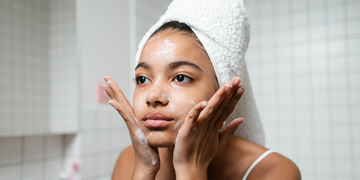How do hormones affect your skin?

Curious about skincare routines? Me too!
I don’t know about you, but I never would have asked a friend or family member about the steps they take to care for their faces in the pre-Instagram stories days. But thanks to social media, I now spend my leisure time watching strangers on the internet wash their faces. And moisturize. And properly apply and remove sunscreen. And other things that I do not necessarily understand.
But I'm seeing people glow and I need to know how.
Well, you’re in luck - I’m not here to talk about just MY skincare, I’m here to talk about all of OUR skincare, and I promise I won’t utter the word serum. While there’s been a lot of focus on the outward appearance and rejuvenation of skin, there’s more than what meets the eye.
It’s not just skin deep.
Hormones impact most of our body's functions, including our skin. Three key hormones play an important role in our skin's health throughout our entire lifetime. They are:
- Estrogen: Estrogen helps to stimulate important ingredients that help our skin to stay firm and plump.
- Progesterone: Progesterone estimates the production of the oil glands in your skin. This can minimize the look of pores and cause the skin to swell. An excess of progesterone can lead to an oil build up.
- Testosterone: Testosterone is generally present during menstruation and, like progesterone, it produces oil through the oil glands.
The levels of these hormones change throughout your different phases of life.
In pregnancy, your estrogen and progesterone levels will increase and can cause a skin condition called melasma in 50-70% of women. Melasma in pregnancy is called chloasma, and consists of dark brownish skin patches appearing in different parts of the face. Chloasma also may cause existing beauty marks - think moles, freckles or birthmarks - to change colors. Even though your skin is literally changing colors, don’t panic. Chloasma isn’t dangerous and won’t cause harm to you or your fetus. If you continue to experience this hyperpigmentation after your pregnancy ends, reach out to your doctor or dermatologist for a consultation and to check for any signs of skin cancer.
During menopause, there is a decrease in your estrogen level that decreases the production of collagen. It is estimated that people with vaginas lose about 30% of their collagen during the first five years of menopause. A decrease in collagen can lead to wrinkles, facial sagging and an overall loss in skin thickness and facial volume. This can be counteracted by taking collagen supplements and filling your plate with collagen rich foods such as egg whites, chicken and fish. Besides feeding your body from the inside, you can also counteract the impact of lessening collagen levels by revamping your skincare routine. Retinol can reduce the appearance of wrinkles, and moisturizers with ceramides can help lock in more moisture to treat any skin dryness. A drop in collagen also makes your skin more prone to UV rays - so make sure you’re wearing proper sunscreen and reapplying regularly.
Additionally, your hormones change throughout your menstrual cycle.
Your hormonal levels for all estrogen, progesterone and testosterone are low during the first few days of your menstrual cycle. Your skin may look a little drier and duller, since your oil glands aren’t being stimulated. Focus on hydration to keep your skin feeling hydrated and refreshed. After about a week, your estrogen levels begin to rise, which can kill off dead skin cells. Estrogen reaches its peak right before ovulation, which means your skin is probably glowing! Go easy on your products and treatments, and snap a few selfies of your radiant self.. After ovulation, estrogen levels drop and progesterone heads towards its peak, meaning you’re more likely to have an oil build up and potentially some small, pesky breakouts. Right before your period, testosterone production increases. This increase is the culprit for those terrible period-related breakouts, which really complements the bloating and cramping that indicates impending menstruation. When those breakouts are making a take over, use products with salicylic acid and really cleanse your pores and kill any lingering bacteria.
Healthy, glowing skin takes hard work, and understanding how your hormones impact your skin is a vital aspect of getting there. Everyday isn’t going to be a good skin day (and those good skin days never fall on the same day as a good hair day, do they?), but understanding how your body works, and what your skin is telling you, (and remember to always wear SPF!) are important ways to better care for yourself.
Keep Reading

How the SAVE Act is impacting married women
Apr 2

I don't want to get pregnant under this administration, what do I do?
Mar 19

Six weeks is too soon: the reality of abortion bans
Feb 24








